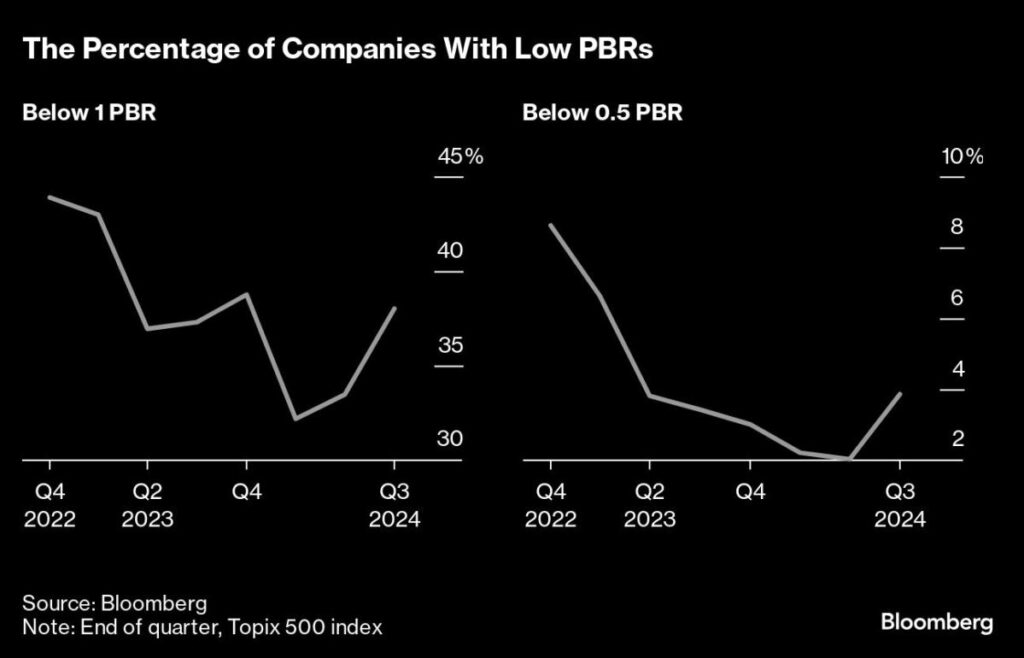(Bloomberg) — An increasing number of Japanese stocks are trading below book value despite corporate reforms that have attracted investor praise, suggesting managers need a bolder approach to drive shareholder wealth.
Most Read from Bloomberg
About 38% of Topix 500 companies were trading below book value as of end-September, up from 32.2% in March, according to data compiled by Bloomberg. That’s a reversal from an earlier falling trend, when the ratio dropped from 43.9% in December 2022 following the Tokyo Stock Exchange’s pressure on low valuation companies to roll out business improvement plans.
One key element to boost price-to-book ratio is return on equity, a measure of a firm’s profitability and profit-making efficiency.
“Governance reform is important but at the end of the day it comes down to whether it leads to higher ROE,” said Keiichi Ito, chief quants analyst at SMBC Nikko Securities Inc. “In that sense, you don’t get the impression that there have been a lot of fundamental stories that lead to higher ROE.”
The average ROE of Japanese companies has failed to rise beyond 9% in recent years, staying below that of their global peers. Meanwhile, the habit of hoarding cash has persisted despite growing share buybacks and dividend hikes, leading to higher book value per share.
The book value per share of Topix 500 companies has increased 21% since the end of 2022, surpassing the rise of 14% for S&P 500 constituents and 3% gains by members of the Stoxx Europe 600 and MSCI Asia ex-Japan indexes.
Unless the increase is accommodated by rising share prices, PBR falls. And when the ratio drops below 1, it would theoretically be better for investors if the companies were dissolved and the assets sold off.
“Although Japanese companies have stepped up shareholder returns, they are not putting back 100% of their profits,” said Fumio Matsumoto, chief strategist at Okasan Securities Co. “If their net assets keep growing and if their stock prices are stagnant right now, the PBR will obviously slip.”
In addition to falling valuation, focus on Chinese stocks may also be eroding the appeal of Japanese stocks. Global investors, who had been large buyers earlier in the year, sold about ¥3.5 trillion ($24 billion) of the nation’s equities in the last six weeks.
Still, some investors remain optimistic that firms will eventually reward shareholders, paying them out of their deep pockets.
“I don’t think hopes of governance reforms have shrunk,” said Shinya Nakao, fund manager at Norinchukin Zenkyoren Asset Management Co, adding that it’s natural for investors to take profits from some low PBR stocks that have risen so much over the past couple of years. “When the global economy is looking down like now, people want to hold quality stocks.”
Others are counting on regulators and the bourse to push for more change. The Tokyo Stock Exchange has said reforms are a work in progress while taking incremental steps such as refining its name-and-shame list.
Drew Edwards, head of GMO LLC’s Usonian Japan Equity fund, said investors have faith in the Japanese government’s commitment to reforms.
“People are encouraged, and more so than they were in the past,” said Edwards, who recently met Japanese government officials as a part of delegate of Asian Corporate Governance Association. “There is a genuine desire by Japanese regulators and policymakers to solicit feedback from market participants, like investors, and continue to implement reforms.”
–With assistance from Ken McCallum.
Most Read from Bloomberg Businessweek
©2024 Bloomberg L.P.
Read the full article here

